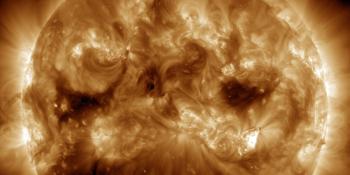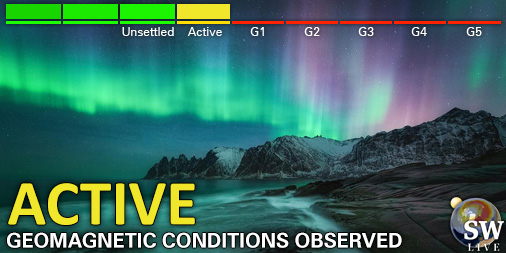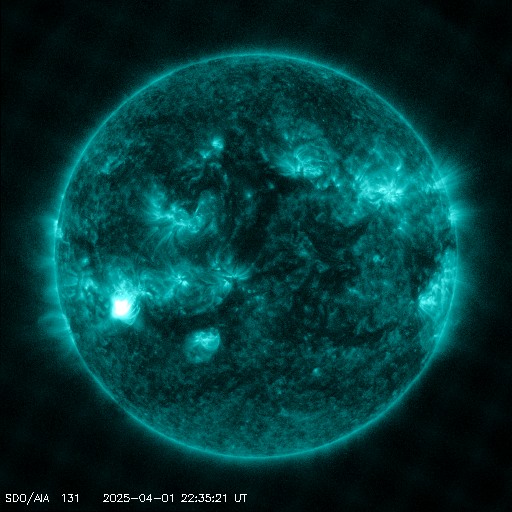Viewing archive of Monday, 2 December 2024
Daily bulletin on solar and geomagnetic activity from the SIDC
Issued: 2024 Dec 02 1231 UTC
SIDC Forecast
Solar flares
C-class flares expected, (probability >=50%)
Geomagnetism
Quiet (A<20 and K<4)
Solar protons
Quiet
| 10cm flux | Ap | |
|---|---|---|
| 02 Dec 2024 | 187 | 012 |
| 03 Dec 2024 | 190 | 012 |
| 04 Dec 2024 | 192 | 007 |
Solar Active Regions and flaring
Solar flaring activity was at low levels, with several C-class flares recorded in the past 24 hours. The largest flare was a C5.5 flare (SIDC Flare 2772) peaking at 16:22 UTC on December 01, associated with SIDC Sunspot Group 323 (NOAA Active Region 3906; beta- gamma). There are currently five numbered active regions on the visible disk. SIDC Sunspot Group 323 (NOAA Active Region 3906) was the main driver of the flaring activity observed over the past 24 hours. Low flaring activity was also produced by SIDC Sunspot Group 305 (NOAA Active Region 3912; beta-gamma). Other regions on the disc have simple configuration of their photospheric magnetic field (alpha and beta) and did not show any significant flaring activity. The solar flaring activity is expected to be at low levels over the next 24 hours, with C-class flares very likely and a chance for M-class flares.
Coronal mass ejections
No Earth-directed coronal mass ejections (CMEs) have been detected in the available coronagraph imagery over the past 24 hours.
Solar wind
Over the past 24 hours, the solar wind parameters (ACE and DSCOVR) reflected near-slow solar wind conditions. The solar wind speed ranged between 410 km/s and 470 km/s. The interplanetary magnetic field remained below 9 nT. The southward component of the interplanetary magnetic field fluctuated between -5 nT and 6 nT. The interplanetary magnetic field orientation was predominantly in the positive sector (field directed away from the Sun). Slow solar wind conditions are expected to prevail during the next days, with a chance of a weak enhancement on Dec 02 due to possible arrival of a high-speed stream from a positive polarity coronal hole, that started to cross the central meridian on Nov 28.
Geomagnetism
Geomagnetic conditions over the past 24 hours were quiet to unsettled both globally and locally over Belgium (NOAA Kp: 1 to 3, K-Bel: 1 to 3). Quiet to unsettled geomagnetic conditions are expected over the next 24 hours.
Proton flux levels
The greater than 10 MeV GOES proton was below the 10 pfu threshold over the past 24 hours. It is expected to remain below the threshold level over the next 24 hours.
Electron fluxes at geostationary orbit
The greater than 2 MeV electron flux, as measured by the GOES-16 satellite, remained below the 1000 pfu alert threshold, and it is expected to remain below the threshold during the next 24 hours. The 24h electron fluence was at normal levels and is expected to remain at these levels.
Today's estimated international sunspot number (ISN): 136, based on 08 stations.Solar indices for 01 Dec 2024
| Wolf number Catania | /// |
| 10cm solar flux | 186 |
| AK Chambon La Forêt | 015 |
| AK Wingst | 008 |
| Estimated Ap | 007 |
| Estimated international sunspot number | 121 - Based on 23 stations |
Noticeable events summary
| Day | Begin | Max | End | Loc | Strength | OP | 10cm | Catania/NOAA | Radio burst types | |
|---|---|---|---|---|---|---|---|---|---|---|
| None | ||||||||||
Provided by the Solar Influences Data analysis Center© - SIDC - Processed by SpaceWeatherLive
All times in UTC
Current data suggests there is a slight possibility for aurora to appear at the following high latitude regions in the near future
Gillam, MB, Yellowknife, NTLatest news
Latest forum messages
Support SpaceWeatherLive.com!
A lot of people come to SpaceWeatherLive to follow the Sun's activity or if there is aurora to be seen, but with more traffic comes higher server costs. Consider a donation if you enjoy SpaceWeatherLive so we can keep the website online!

Latest alerts
Wednesday, 2 April 2025
04:03 UTC - Hemispheric Power Index
The OVATION model predicts the Hemispheric Power Index to reach 50GW at 04:56 UTC
01:45 UTC - Geomagnetic activity
Active geomagnetic conditions (Kp4) Threshold Reached: 01:32 UTC
Tuesday, 1 April 2025
22:51 UTC - Solar flare
Moderate M2.5 flare
22:30 UTC - Radio Blackout
Minor R1 radio blackout in progress (≥M1 - current: M1.45)
07:15 UTC - 10cm Radio Burst
Begin Time: 01/04/2025 06:45 UTC Maximum Time: 01/04/2025 06:45 UTC Duration: 1 minutes. Peak flux: 190 sfu
Space weather facts
| Last X-flare | 2025/03/28 | X1.1 |
| Last M-flare | 2025/04/01 | M2.5 |
| Last geomagnetic storm | 2025/03/27 | Kp5 (G1) |
| Spotless days | |
|---|---|
| Last spotless day | 2022/06/08 |
| Monthly mean Sunspot Number | |
|---|---|
| February 2025 | 154.6 +17.6 |
| April 2025 | 152.5 -2.1 |
| Last 30 days | 130.7 -17.9 |




